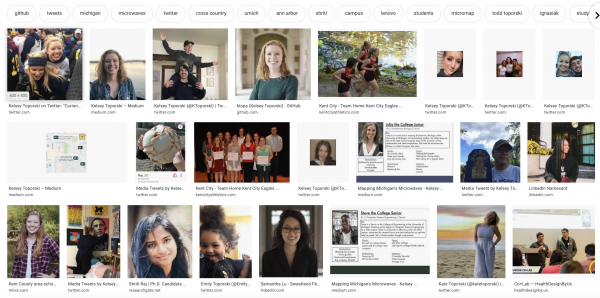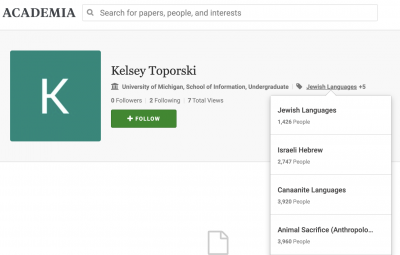User:Ktops
Hi I'm Kelsey
Contents
look now it's bigger
ah
Introduction
My online life has seen plenty of change over the past decade. Ten years seems like a lot as I’m only in my early twenties, but just under ten years ago, I made my first official social media debut – I got a Facebook, and boy, was I devoted. I posted religiously, I added information about myself to create my profile, I liked pages any time I saw anything I was relatively interested in.
As the years went on, I got an iPhone, and I slowly accumulated more and more social media and built more of an online presence. Instagram, Tumblr, Twitter, Snapchat – you name it, I had it. At this same time, I was also starting to do more noteworthy things as a person. I was finishing up high school, playing sports and instruments, going to college, posting more things online to keep various people updated.
In the past few years while in college, my social media use has slowed considerably for a variety of reasons. I never tweet, I never post on Facebook. I use my Instagram regularly, but I’ve switched it from public to private. I’m still doing things in school, but my time being recognized for academic achievements is just about up. So, who does the internet say I am as a person? What have they collected on me that they think is worth something? Let’s find out.
Google Search
Images
My Google search images were interesting, and I think they gave away more about those who are connected to me in some way – friends, family, teachers, coworkers, people I went to high school with, etc. – than they gave away about me.
The first four pictures shown are all from accounts that I had set up: an old Twitter profile picture, my Medium profile picture, my current Twitter profile picture (which I just changed last week), and my GitHub profile picture.
After that, it’s a mix of pictures of me running, media I’ve posted on Twitter, pictures of me from news articles, and some pictures from blog posts that I’ve made.
What I found most interesting was the amount of pictures of people I knew who were not me. There were pictures of people I talk to every day, people I’ve worked with, and people I haven’t spoken to in years, but a vast majority of them were people I knew, or I could at least tell why they had shown up when my name was searched.
It makes it seem like Google hasn’t attached a picture to my name for any kind of facial recognition (that we know of, yet), but that they rely mostly on where my name has been mentioned.
Social Media
In my search results for my name, social media presented itself first and foremost. My LinkedIn, Twitter, Instagram, Medium, and Facebook were all the top results, and profile pictures for those accounts show up first in an image search as well. I was relieved when my Tumblr wasn’t shown as a search result. I purposefully set up my Tumblr back in high school to not be attached to my name, so I wouldn’t have to worry about what I was posting. For the record, I wasn’t posting anything bad, we all just need a little anonymity sometimes.
I almost appreciate that my social media platforms are my first results, because those are the things I have the most control over. If I ran a slow race in high school and someone wants to see that, I can’t do anything. I can’t control what someone might say about research I was a part of. I can present myself in the best way possible through social media however, which I feel is a much better representation of who I am – but I’m probably biased.
Academics
When you google my name, you can find quite a bit about my academic history. You are able to see things from my high school days – my cross country and track race times, my class standing, new articles I was mentioned in at the time. You can also find plenty about my time at U of M, such as projects I’ve put online, research papers I’ve helped write, what I’m studying, etc. You can even find my school email with relative ease. Of course, most of this is also detailed on my LinkedIn profile as well.
One thing that I found particularly entertaining was that one website I found – Academia.edu – said that I studied “Israeli Hebrew, Canaanite Languages, and Animal Sacrifice.” None of these things are true, but they do make sense to me. Last year I took a class called “Women and the Bible” that focused heavily on the old testament, where we would often compare the Hebrew version to the English translation. I had to write several papers in that class, and so this website likely scrapes data from when I look up academic papers on specific topics. The funny thing here is that if you didn’t know me or know that specific story, you would likely be confused by this finding.
Other
As some additional fun finds in my googling of myself, I found out the following:
- I hold a 10th place record for fastest 3200 Meter Relay time in middle school track at my middle school
- A paper I wrote part of for a research conference got an honorable mention for best paper
- I’m a member of a professional tech frat called Kappa Theta Pi on campus here
- It took me 31 minutes to run an ugly Christmas sweater 5k in 2013
Who’d have known?
Data Broker vs. Googling Skills
The data provided by Instant Checkmate was largely uninteresting, first and foremost because all of the correct data broker info found on me I was able to find with under 10 minutes of googling, for free, and almost all of it was information that I had personally put online.
I also found the data broker data to be old, incorrect, and lacking. Old addresses, missing family members, and incorrect email addresses left much to be desired, especially from a paid service.
Sure I may know now to not make one of my security questions “what is the name of the street your childhood home is on,” but other than that, I couldn’t find a way to make this information exciting to me or imagine a way to make this data useful to someone else, with good or bad intentions. Do they have my phone number? Yes, but that can be changed. Do they have my home address? Yes, but I don’t live there anymore, and coincidentally, my family just moved from that address.
These facts lead me to believe that data brokers, at least those similar to the ones we used, are of no real threat to me. The data is composed of things I put out there myself, and searching on Google gave me a more complete picture of who I am and what I’ve done (that’s been documented at least).
Conclusion
I found both the data from googling myself thoroughly and the data collected on me by my social media accounts to be much more holistic, and in turn, much more alarming.
In googling myself, as I said above, I was able to find everything that the data broker provided me about myself. In addition to that, I was able to find pictures of people I knew, all my social media and online accounts that have my name attached, articles where research I’ve done has been cited, and even race times all the way back from middle school cross country meets.
In looking at my ad preferences and inferred interests for Google and some of my social media, they clearly have a more clear view of who I am and what I’m interested in. However, it’s not like they’ve got it all figured out about me. I don’t Google everything I want to know where it can be traced and connected back to my name. There are things I’d prefer to keep to myself, and so I am very purposeful about what I share, and how I search.
I am able to keep a certain level of privacy that separates my online life from my real self; relevant data points are missing.
I am more than my digital footprint.

